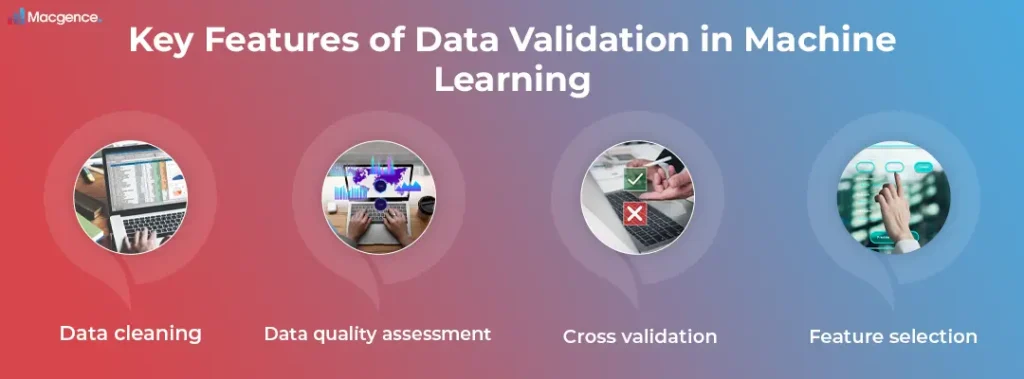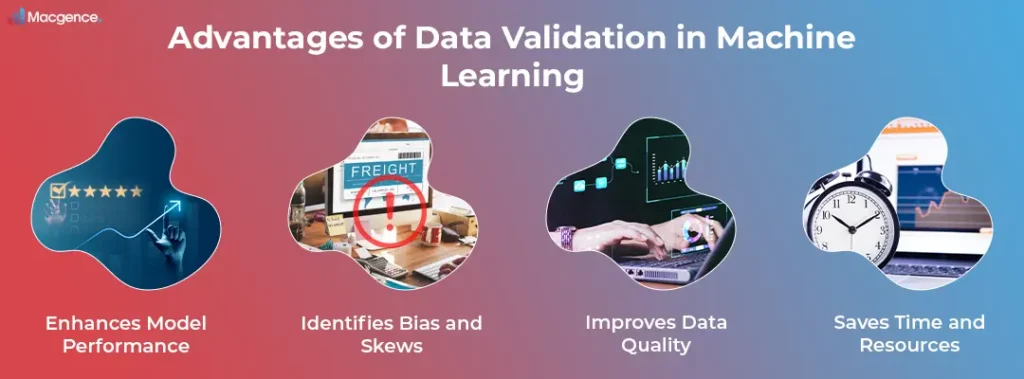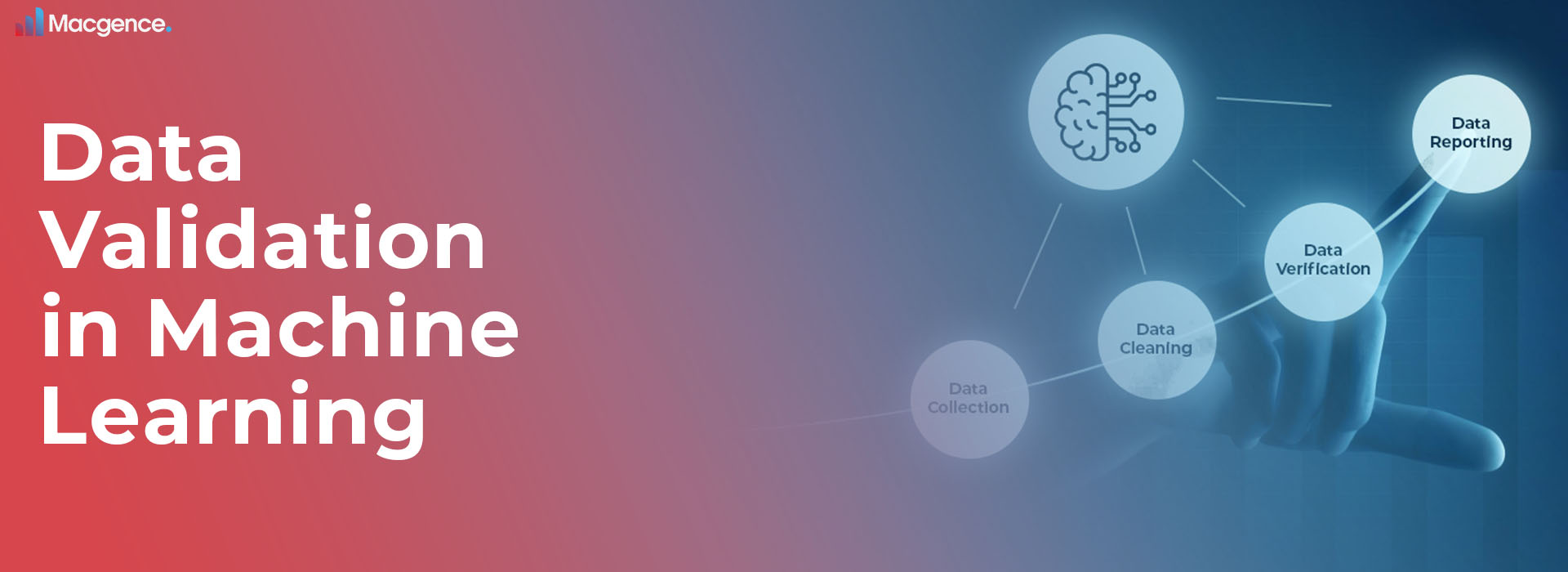The Vital Role of Data Validation in Machine Learning
As the world is rapidly evolving and improving in the space of ML, also known as Machine Learning. There is a high need to ensure the reliability and integrity of the data validation processes that have been provided. That’s where data validation in machine learning comes in. It’s all about checking that the data we use to teach our machines is reliable and truthful.
This blog will dive into why data validation matters so much in ML. We’ll explore how it helps us make our models accurate and keep our data in good shape.
Data validation means we don’t rely on other tools or platforms to check our data. Instead, we directly handle our data sources and checks. This helps us understand our data better and make sure it’s top-notch for training our ML models.
Why is Data Validation important?
The process of ensuring that the data is being used for training purposes and testing ML models for accuracy, reliability and representation of real world scenarios is known as data validation.
It involves verifying the quality and consistency of the data to eliminate errors and biases. That could compromise the performance of ML algorithms. This validation of data to help organizations in enhancing the reliability and accuracy. Their ML models can lead to more precise predictions and actionable insights.
What are the Key Features of Data Validation in Machine Learning:

Data validation plays a crucial role in machine learning that ensures that the data utilized for training and testing models is dependable, precise, and reflective of real-world conditions. Key features of data validation in machine learning include:
- Data cleaning: normalization, outlier detection, and imputation of missing values are few of the features that help ensure that the data is suitable for training machine learning models.
- Data quality assessment: There are various techniques such as summary statistics, data profiling and visualization that are used to access data quality.
- Cross validation: These techniques are used to assess the performance of the machine learning models as it involves dividing the data into multiple subsets training the model and evaluating its performance.
- Feature selection and dimensional analysis: This feature is used to identify the most relevant features and even reduces the dimensionality of the data which can lead to the improvement of model performance and even reduces overfitting.
The use of these features can lead to the models being trained and evaluated by using high quality data which in turn leads to more accurate and reliable data predictions.
What are the advantages of Data Validation in Machine Learning?

Data validation is extremely important in machine learning for several reasons:
- Enhances model performance: as we start validating the data and ensuring its integrity, models are less likely to be influenced by huge amounts of noisy data which leads to better accuracy predictions and better generalization to unseen data. This ensures high quality data to better performing models.
- Identifies Bias and skews: data validation in ML can help in revealing bias by analyzing the distribution of the data and its characteristics. So that practitioners can identify and mitigate biases that could lead to discriminatory outcomes in the model’s predictions
- Improves Data Quality: as the data that is used for testing and training models is of high quality, data validation can help in identifying and correcting inconsistencies, errors, and missing values which helps in improving the accuracy of the models that build on the data.
- Saves time and resources: As the data is validated up front, detecting and correcting errors early in the process can save time and resources that would otherwise be spent training and debugging models with corrected data.
Hence, data validation acts as a crucial step in machine learning flow that contributes to the development of accurate and fair models.
Get started with Data Validation in Machine Learning with Macgence:
Macgence specializes in data validation for machine learning, ensuring the accuracy and reliability of your AI models. Our advanced techniques and rigorous processes eliminate duplicates, authenticate data, and address data drift, fortifying the foundation upon which your models are built.
With Macgence’s expertise, you can trust that your machine learning endeavours are supported by validated data. Driving precise predictions and informed decision-making.
At Macgence, we’re dedicated to helping you succeed in the ever-evolving world of AI. Trust Macgence to be your strategic partner in unlocking the power of AI for sustainable growth and success.
Conclusion
As we have clearly learned in this blog. Data validation plays an important role in ensuring the accuracy and reliability of machine learning models. By effectively managing the data, organizations can successfully mitigate errors, biases, and data drift, thereby leading to more accurate predictions. Moreover, by adopting the practice of data validation. Organizations can ultimately unlock the full potential of ML and drive innovation in various domains.
At Macgence, we specifically specialize in data validation for machine learning. Providing advanced techniques and rigorous processes to ensure the accuracy and reliability of your ML models. With our expertise, you can undoubtedly trust that your ML endeavors are built on a solid foundation of validated data. Thus driving precise predictions and informed decision-making. Therefore, partner with us today to harness the power of data validation and unlock new possibilities in machine learning.
FAQs
Ans: – The main things we do to check data in machine learning chiefly include cleaning it up, checking its quality, additionally doing cross-validation, and analyzing its dimensions. Altogether, these steps help ensure that the data we use to train machine learning models is accurate and dependable.
Ans: – First-party structures offer organizations direct control over data validation processes, enhancing transparency and accountability while optimizing performance and accuracy.
Ans: – Data validation significantly enhances model performance. Further identifies bias and skews, moreover improves data quality, and consequently saves time and resources by detecting and correcting errors early in the process. Ultimately contributing to the development of accurate and fair models.
You Might Like
February 28, 2025
Project EKA – Driving the Future of AI in India
Artificial Intelligence (AI) has long been heralded as the driving force behind global technological revolutions. But what happens when AI isn’t tailored to the needs of its diverse users? Project EKA is answering that question in India. This groundbreaking initiative aims to redefine the AI landscape, bridging the gap between India’s cultural, linguistic, and socio-economic […]
April 5, 2025
The Ultimate Guide to Geospatial Data Collection Providers
Geospatial data collection has become an essential part of modern industries, playing a vital role in urban planning, environmental monitoring, transportation, agriculture, and defense. With the advent of advanced technologies such as artificial intelligence (AI), satellite imaging, drones, and LiDAR, the geospatial industry is witnessing a rapid transformation. In this blog, we will explore some […]
April 1, 2025
The Strategic Benefits of Partnering with Macgence for Model Evaluation and Validation
In the rapidly evolving AI landscape, ensuring robust model performance is not just an advantage—it’s a necessity. For businesses leveraging AI/ML technologies, partnering with a specialized validation partner like Macgence can mean the difference between unreliable prototypes and enterprise-grade AI solutions. At Macgence, we bring unmatched expertise in AI model evaluation and validation to help […]
March 24, 2025
Natural Language Generation (NLG): The Future of AI-Powered Text
The ability to generate human-like text from data is not just a sci-fi dream—it’s the backbone of many tools we use today, from chatbots to automated reporting systems. This revolution in artificial intelligence has a name: Natural Language Generation (NLG). If you’re an AI enthusiast or a tech professional, understanding NLG is essential for keeping […]


 Previous Blog
Previous Blog







